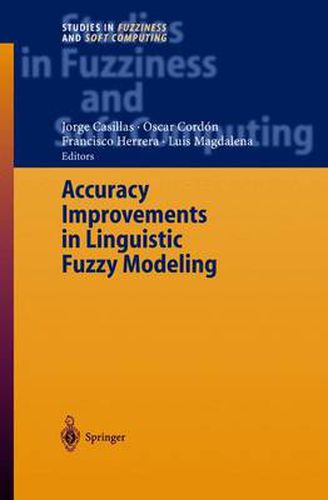Readings Newsletter
Become a Readings Member to make your shopping experience even easier.
Sign in or sign up for free!
You’re not far away from qualifying for FREE standard shipping within Australia
You’ve qualified for FREE standard shipping within Australia
The cart is loading…






This title is printed to order. This book may have been self-published. If so, we cannot guarantee the quality of the content. In the main most books will have gone through the editing process however some may not. We therefore suggest that you be aware of this before ordering this book. If in doubt check either the author or publisher’s details as we are unable to accept any returns unless they are faulty. Please contact us if you have any questions.
Fuzzy modeling usually comes with two contradictory requirements: interpretability, which is the capability to express the real system behavior in a comprehensible way, and accuracy, which is the capability to faithfully represent the real system. In this framework, one of the most important areas is linguistic fuzzy modeling, where the legibility of the obtained model is the main objective. This task is usually developed by means of linguistic (Mamdani) fuzzy rule-based systems. An active research area is oriented towards the use of new techniques and structures to extend the classical, rigid linguistic fuzzy modeling with the main aim of increasing its precision degree. Traditionally, this accuracy improvement has been carried out without considering the corresponding interpretability loss. Currently, new trends have been proposed trying to preserve the linguistic fuzzy model description power during the optimization process. Written by leading experts in the field, this volume collects some representative researcher that pursue this approach.
$9.00 standard shipping within Australia
FREE standard shipping within Australia for orders over $100.00
Express & International shipping calculated at checkout
This title is printed to order. This book may have been self-published. If so, we cannot guarantee the quality of the content. In the main most books will have gone through the editing process however some may not. We therefore suggest that you be aware of this before ordering this book. If in doubt check either the author or publisher’s details as we are unable to accept any returns unless they are faulty. Please contact us if you have any questions.
Fuzzy modeling usually comes with two contradictory requirements: interpretability, which is the capability to express the real system behavior in a comprehensible way, and accuracy, which is the capability to faithfully represent the real system. In this framework, one of the most important areas is linguistic fuzzy modeling, where the legibility of the obtained model is the main objective. This task is usually developed by means of linguistic (Mamdani) fuzzy rule-based systems. An active research area is oriented towards the use of new techniques and structures to extend the classical, rigid linguistic fuzzy modeling with the main aim of increasing its precision degree. Traditionally, this accuracy improvement has been carried out without considering the corresponding interpretability loss. Currently, new trends have been proposed trying to preserve the linguistic fuzzy model description power during the optimization process. Written by leading experts in the field, this volume collects some representative researcher that pursue this approach.